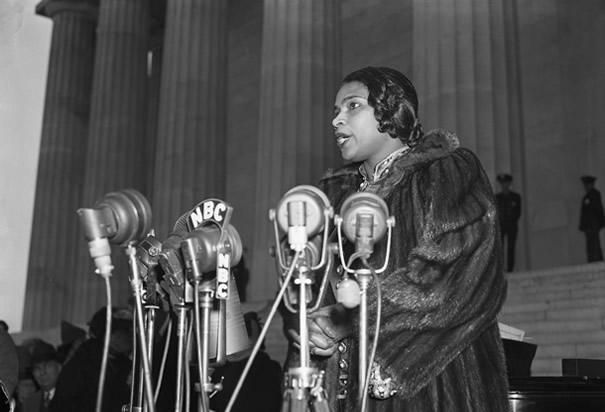“Hold the red star proudly high in hand!”
Wednesday - 01 February 2012
It’s not only midweek and new comics day, it’s also 2-1-12… which means it’s also Rush Day!
Today is also the day that HeroClix: Star Trek Tactics hits the shelves. (Think Star Fleet Battles… but updated. And in ‘Clix form.)
After the girls were asleep last night, I headed out to meet the guys for Guys’ Night Out. It was a good crowd. And, when mixed with good food, drink and conversation, made for a great way to spend a Tuesday night.
Today, to quote Al Jarreau: “I got my certain and my sure ‘nough on…” In other words: It’s a suit day. Grey herringbone suit, white and purple striped shirt, purple tie, white pocket square, grey socks, black loafers AND… purple LEGO cufflinks. BAM!
And tonight is movie night. (And I still have NO idea what we’re going to watch…)
Chew on This: Food For Thought - Black History Month
Today also marks the start of Black History Month.

Today’s person of note is: Marian Anderson

Marian Anderson (February 27, 1897 - April 8, 1993) was an African-American contralto and one of the most celebrated singers of the twentieth century. Most of her singing career was spent performing in concert and recital in major music venues and with major orchestras throughout the United States and Europe between 1925 and 1965. Although she was offered contracts to perform roles with many important European opera companies, Anderson declined all of these, preferring to perform in concert and recital only. She did, however, perform opera arias within her concerts and recitals.
Anderson displayed vocal talent as a child, but her family could not afford to pay for formal training. From the age of six, she was tutored in the choir of the Union Baptist Church, where she sang parts written for bass, alto, tenor, and soprano voices. Members of the congregation raised funds for her to attend a music school for a year. At 19 she became a pupil of Giuseppe Boghetti, who was so impressed by her talent that he gave her free lessons for a year. In 1925 she entered a contest with 300 competitors and won first prize, a recital at Lewisohn Stadium in New York City with the New York Philharmonic Orchestra.
Anderson became an important figure in the struggle for black artists to overcome racial prejudice in the United States during the mid twentieth century. In 1939, when the Daughters of the American Revolution (DAR) refused to allow her to perform at Constitution Hall in Washington, D.C., Eleanor Roosevelt resigned her DAR membership in protest and sponsored Anderson’s concert at the Lincoln Memorial, before a crowd of more than 75,000 people and a radio audience in the millions.
Anderson continued to break barriers for black artists in the United States, becoming the first black person, American or otherwise, to perform at the Metropolitan Opera in New York City on January 7, 1955. Her performance as Ulrica in Giuseppe Verdi’s Un ballo in maschera at the Met was the only time she sang an opera role on stage.
She also worked for several years as a delegate to the United Nations Human Rights Committee and as a “goodwill ambassadress” for the United States Department of State. The recipient of numerous awards and honors, Anderson was awarded the Presidential Medal of Freedom in 1963, the Kennedy Center Honors in 1978, the National Medal of Arts in 1986, and a Grammy Lifetime Achievement Award in 1991.
In 2001, the 1939 documentary film, Marian Anderson: the Lincoln Memorial Concert was selected for preservation in the United States National Film Registry by the Library of Congress as being “culturally, historically, or aesthetically significant”.
On January 27, 2005, a commemorative U.S. postage stamp honored Marian Anderson as part of the Black Heritage series. Anderson is also pictured on the US$5,000 Series I United States Savings Bond.
The Marian Anderson Award was originally established in 1943 by Anderson after she was awarded the $10,000 Bok Prize that year by the city of Philadelphia. Anderson used the award money to establish a singing competition to help support young singers. Eventually the prize fund ran out of money and it was disbanded in 1976. In 1990 the award was re-established and has dispensed $25,000 annually. In 1998 the prize was restructured with the “Marian Anderson Award” going to an established artist, not necessarily a singer, who exhibits leadership in a humanitarian area. A separate prize, the “Marian Anderson Prize for Emerging Classical Artists” is given to promising young classical singers.
(Information courtesy of biography.com, FactMonster.com and Wikipedia)
Stray Toasters
- Early filers may have to wait longer for their tax refund
- You Bought It, but Do You Own It?
- A couple of sad bits of news:
- Breast Cancer Surgery Rules Are Called Unclear
- From the “Whiskey Tango Foxtrot…?!” file: Twitter jokes ruin U.S. vacation for two British tourists

- Al Jarreau will be in concert in Las Vegas in April. Hmm…
- This is what women in superhero comics should be
- Why Komen defunded Planned Parenthood
- Home ownership rates fall to 66% as downturn nears a bottom
- Google won’t pull Android apps deemed malicious
Namaste.
Originally published at Random Access
» Click here « to leave any comments.